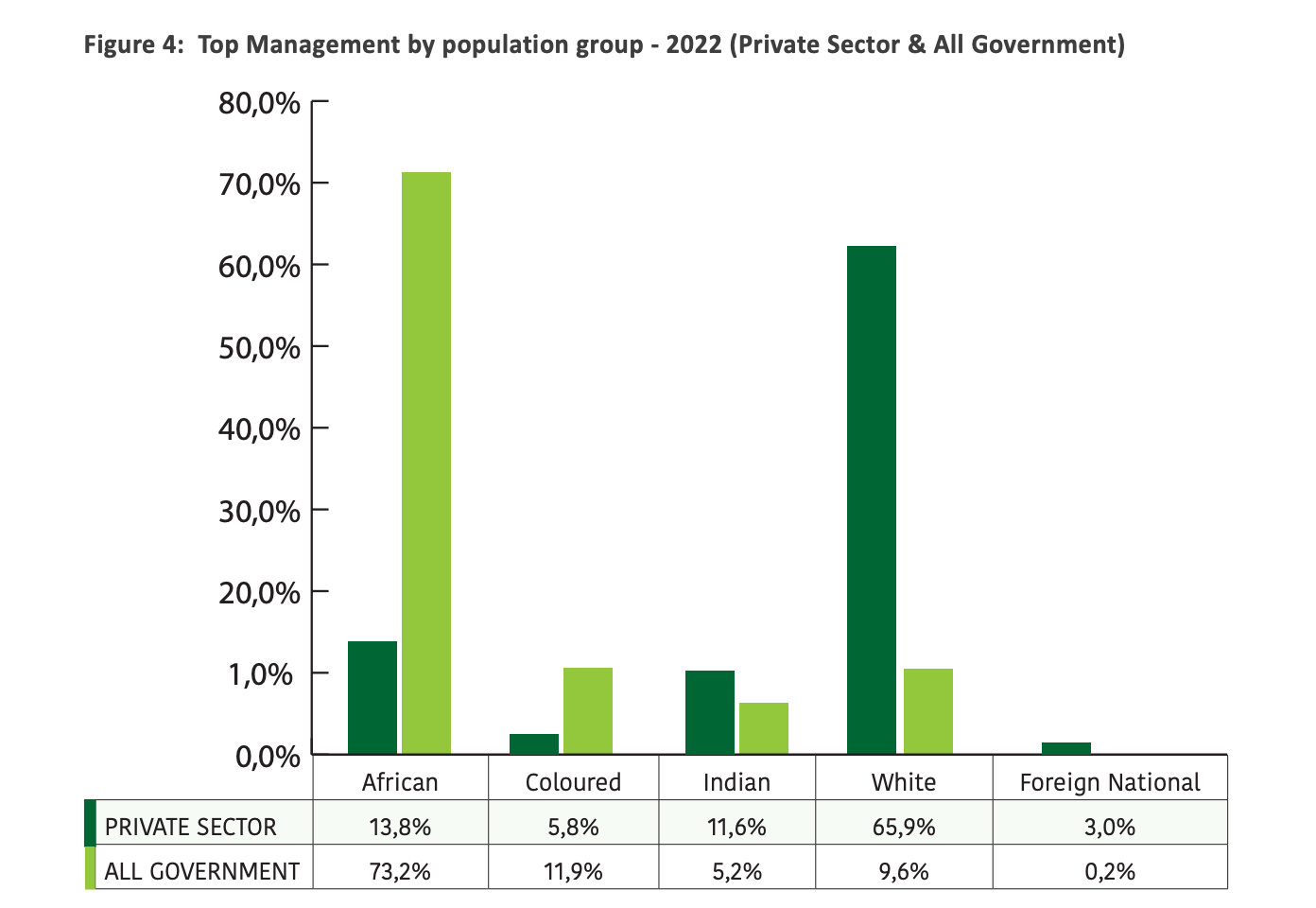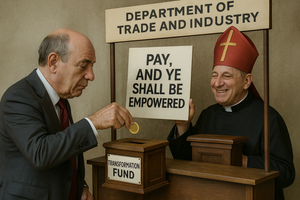The Department of Trade and Industry is reportedly considering a voluntary way of “shortcutting” black economic empowerment regulations, which would allow unlisted companies to bypass some aspects of South Africa’s employment equity project by paying a fee, speculatively set at 3% of turnover. The idea is that this fee will provide an automatic Level-3 BEE status, and the money will go into a R40-billion-a-year transformation fund, which will then support black empowered businesses.
This is a slightly watered down version of a similar idea mooted in March, which would require companies to pay their investment obligations in terms of existing BEE regulations to the government with which it would establish a different R100-billion transformation fund.
The March proposal was rejected outright by business groups and policy organisations, though his new idea has received some support from business people, notably Alan Knott-Craig, who wrote in Business Day an article last week entitled “In defence of the Transformation Fund”. Its improvements on the earlier version are also noted by Business Day columnist Stuart Theobald, who remains sceptical, but is open to a test run. Business Day itself gave guarded support to the idea in an editorial, also suggesting it was worth testing “but on a tight leash”.
There is no clarity on whether there will now be two separate funds, or the new proposal replaces and kills the idea tabled in March.
I would like to make the opposite argument: I think this is an absolutely terrible, horrible, no good, very bad idea (as the children's book title had it). It is frankly shocking to me that prominent columnists should even consider guarded support for it, not to mention the country’s premier business publication. Their complicity is predictable, since it seems everybody wants to be on the nice side of this debate (apart, I guess, from me), particularly if you are a white male; it's called virtue signalling, especially if you need to be licensed by government, or you are doing business with government, or you need access to government spokespeople. So, hedging their bets is understandable, but IMHO, they are displaying a remarkable lack of historical knowledge that is unforgivable. A righteous objection is founded, as you might expect, on the history of the Catholic church.
A quick historical diversion is necessary here. The early Christian church came up with the idea for spiritual remissions of penance. After sin was confessed and forgiven, a penance (fasting, pilgrimage, alms-giving) remained. But, happily, indulgences reduced that burden, often granted by bishops for good works or acts of devotion.
By the middle ages, this had evolved, mainly because of the cost of the Crusades. In the 11th century, popes offered plenary indulgences (full remission of temporal punishment) to those who took up the cross or supported crusaders. Money wasn’t the focus yet - service and sacrifice were.
But then in the 14th century, as papal finances became strained, indulgences became monetised. Instead of performing an act of charity, you could donate money to a pious cause - repairing churches, ransoming captives, funding hospitals - and receive the same spiritual benefit. The logic was that the gift was still a “good work”, just conveniently remitted in actual cash. Neat!
From there, it was a short step into perdition. By the 1500s, indulgences were sold on an industrial scale. In 1515, Pope Leo X authorised a massive indulgence campaign to fund St Peter’s Basilica. The world later found out that half the proceeds of that little effort went to Rome, but the other half went to a German banker called Fugger, who was financing Archbishop Albert of Mainz’s purchase of his ecclesiastical office. And the advertising business also blossomed. Johann Tetzel, a Dominican preacher, came up with a very early ad jingle: “As soon as a coin in the coffer rings, a soul from purgatory springs,” was his ditty. I am not making this up.
And after that, there followed the inevitable backlash. In 1517, Martin Luther, outraged that salvation seemed to now be for sale, nailed his Ninety-Five Theses to the Wittenberg church door. He argued that forgiveness couldn’t be bought and that indulgence preachers misled the faithful. The result was that Western Christendom was shattered, there were wars, reformations, and all that stuff. On the positive side, St Peter’s remains a great tourist attraction.
Obviously, you see where I am going with this. The progression is the thing. Black Economic Empowerment started as a joint voluntary effort, which gained support from a broad cross-section of society because of its obvious value and necessity. It was creative, unusual, moral, and rooted in virtue. It was a real South African effort to reset history and foster justice. History could not be redone, but it could be reworked. And with all kinds of forwards and backwards steps, it has in fact worked, after a fashion.
Among JSE-listed firms that filed to the B-BBEE Commission for 2022, average black ownership is now around 30%, the commission reported. Of course, we don’t know how much of that would have happened anyway, but from zero to a third is, you know, something. That doesn’t mean, btw, that 70% is white owned, because there is also institutional and foreign ownership. I would guess “black” and “white” ownership of shares is now about 50/50, which would make sense, since the black and white middle class are now about the same size. The stock market, as people tend to forget, is essentially a function of retirement savings. That is also reflected in boards of listed companies, which are now about 50% “black” in SA parlance, i.e., black, mixed-race, or of Indian-origin.
But it's important to note what has not been achieved: the even split still means whites still wildly dominate, since they constitute only 7% of the population. More importantly, what BEE has not achieved is a less unequal society; SA’s Gini coefficient - if you believe these things - is totally unchanged. Even worse, unemployment is as bad, if not worse, than it's ever been. And at top management level, the 2023 Commission for Employment Equity data shows the breakdown as White 62%, African 16.9%, Coloured 6.1%, Indian 11.2%; men comprise 73.5%. Senior management is somewhat more diverse (White 50.1%, African 26.4%).

So here is an ugly question: are these two things linked? Has SA’s BEE effort achieved better equity ownership for a small slice of the black elite at the expense of increasing total employment? Of course, you can’t demonstrate a counterfactual, but it's worth considering. There are other unasked and unanswered questions here too: if BEE is not working, as the CEE data suggests, does it mean compliance is bad or that the BEE system is badly designed?
But anyway, back to indulgences.
Claiming to be frustrated with the lack of progress, even though quite a lot of progress has been made, government is now proceeding to the next level, and has suggested monetising its indulgences. This is just a suggestion at this point; there has been no Treasury modelling, nor is there an established SARS fund, or anything like that. It's just an idea at this point.
But nevertheless, it's worth considering what is happening here. It's comparable to the way the church sets up an obstacle to accession to heaven (sin), but then creates a way to bypass this obstacle (an indulgence) for a little tinkling in the cash register. Likewise, government has set up an obstacle to the free movement of capital, and is now proposing a way to (partly) bypass this obstacle for cash.
Why is this happening? That is pretty simple to answer: because the government is reaching the outer limits of its ability to borrow. And also - and more importantly - corruption has been institutionalised. To my knowledge, there has been no large-scale government corruption in SA in the recent past that has not involved, at least partly, BEE. The comparison with the Catholic church of the Middle Ages is not perfect, but it's illuminating, surely?
The apologists claim this payment is not a “tax” because it's voluntary. However, it's only voluntary if you assume the base argument, which is that the creation of the obstacle is valid.
Knott-Craig highlights that the levy is calculated as 3% of revenue, which is simple and transparent compared to the multifaceted BEE scorecard system. Traditional BEE compliance often involves significant costs for advisors, auditors, and legal teams. A 2023 report by the South African Chamber of Commerce and Industry (SACCI) estimated that small and medium enterprises (SMEs) spend an average of R500,000–R2 million annually on BEE compliance-related activities, including verification and structuring deals. The 3% levy eliminates these overheads, allowing businesses to focus on core operations.
Inadvertently, Knott-Craig is answering his own question. One way to avoid compliance is to pay the fee, as he suggests. But the other possibility would be to scrap the compliance requirement in the first place. He regards BEE as inviolable, and it's only in that sense that it's even vaguely sensible to endorse the indulgence idea. There are other objections too: 3% of turnover - probably 30% of profit - is a massive price to pay for a chance, not a certainty, of being able to nail a Government tender. And anyway, trust me, you are not going to get it; it's probably going to go to the guy who is friends with the minister whatever your notional BEE score is.
But there is a much more fundamental moral issue: the whole BEE effort extends the notion of racial classification. I know it's not phrased that way, but it does. It is, by definition, "racist", excused because of its focus on “retribution”. But it still functions on the premise of differential skin pigmentation, as did horrendous apartheid policies.
It's often assumed that black South Africans are totally supportive of BEE, which superficially would make sense because it’s designed to benefit them. But surely black South Africans must also factor into the equation the implicit insult involved in being advantaged in a country in which they are the vast majority? I'm guessing here, but surely? Just as white males have to suffer the indignity of not being promoted despite being the most qualified, black men and women have to suffer the indignity of the assumption that they only get promoted because of BEE.
Doubling down on BEE, which is effectively what is happening here, doubles down on these indignities too.
And then there is corruption. We live in an age when there is currently an investigation into whether or not President Cyril Ramaphosa's nephew, Hangwani Maumela, legitimately possesses not one, but three Lamborghinis, along with a whole bunch of other stuff, after winning a huge contract from Tembisa Hospital.
Simultaneously Deputy National Police Commissioner Lieutenant-General Shadrack Sibiya, has been suspended, after KwaZulu-Natal Police Commissioner Nhlanhla Mkhwanazi publicly accused Sibiya of withdrawing or reassigning 121 case dockets that had been under the “Political Killings Task Team” (a unit investigating politically motivated killings). Mkhwanazi alleges Sibiya did this at the instruction or influence of Police Minister Senzo Mchunu. There is no evidence linking these two cases, but there is plenty of conjecture. There certainly does seem to be a link because the SIU raids on the homes of Hangwani Maumela’s home, Shadrack Sibiya and Police Minister Senzo Mchunu's chief of staff, Cedrick Nkabinde's appear to have been coordinated and took place on the same day, Thursday last week.
This is the police. This is law enforcers we are talking about. The top ranks. Let me just repeat that. This is the police we are talking about. Now tell me again about those indulgences?
I have some suggestions about how to address this for paying customers: If you would like to take a squizz, please do subscribe; it costs less than a medium Starbucks cappuccino, and it's much less healthy!
